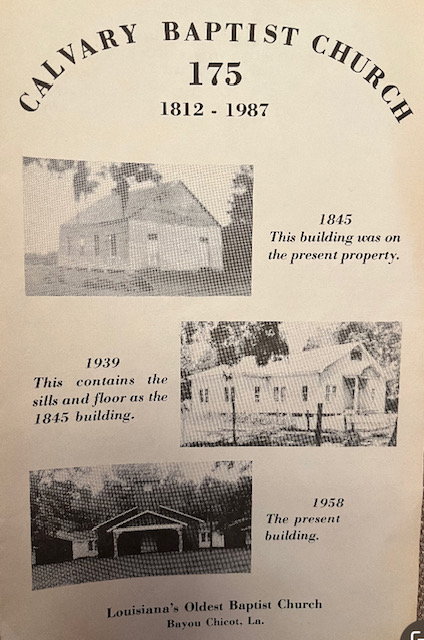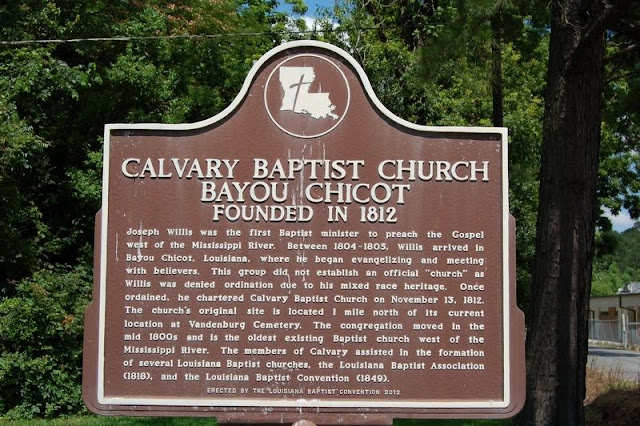A few years later he married Hannah and they added more children to the Willis family. Hannah also shared Joseph's calling to the people of the Louisiana Territory. Together with all their children, they made the long, arduous and dangerous journey into the Louisiana territory and to Bayou Chicot as early as 1802 where they purchased land. A line in his obituary reads, "The Gospel was proclaimed by him in these regions before the American flag was hoisted here," meaning before April 30, 1803.
An interesting personal side note here is that the Willis family built their first home near Bayou Cocodrie, which is where our dad later built his fishing cabin. (See Part 5 of our Lazenby Story) Joseph faced his own ostracism there, but so did Porter Lazenby years later.
Chicot was becoming a thriving trade community by this time and other English-speaking people had begun to settle there. Among those who followed Joseph were his friends from the Pee Dee Region of South Carolina, Gilbert and Fanny Taylor Sweat, Fanny's daughter Delaney and her husband, John Bass, also "a free man of color". They would play a pivotal role in establishing churches in that area.
Joseph Willis, along with his friends met as a group of believers but were unable to establish a church in Bayou Chicot because of existing prejudice by his own denomination in Natchez, Mississippi, that prevented his being ordained as a Baptist pastor.
Three messengers from the Mississippi church traveled to Chicot and officially ordained the pastor, who immediately and officially constituted the Calvary Baptist Church in Bayou Chicot on November 13, 1812 with six members including the Sweats and Basses.
The original Calvary Baptist Church building was built on land donated by Gilbert and Fanny Sweat. Delaney and John Bass helped organize another of the churches, perhaps in the Cheneyville area.
There is an interesting line in Miss Mable's book that tells us that a Delaney Bass at some point married Greene Whittington and had seven children, one of whom is a direct ancestor of my brother-in-law, and Gingie's husband, Thomas Whittington. This Delaney Bass Whittington is the granddaughter of Gilbert and Fanny Sweat who followed Joseph Willis from South Carolina.
Some historians recognize Joseph Willis as "the father of the Baptist religion in Louisiana" for having planted this, the first Baptist Church west of the Mississippi River. Louisiana had barely been a state seven months and was in turmoil when this church was founded.
There was more turmoil on the horizon that also affected this part of the country. Great Britain did not consider the Louisiana Purchase legally valid, and Congress had declared war on Great Britain about five months earlier to start the War of 1812.
Ezekiel O'Quinn, Joseph's long-time childhood friend would later follow Joseph to Louisiana as the second Baptist minister west of the Mississippi River. He was the first pastor of one of the churches Joseph started, Beulah Baptist Church in Cheneyville.
In 1845 Thomas Keller donated one acre of land for a new building. It is on this same plot of land that the current church stands.
On October 31, 1818, O'Quinn, Joseph Willis and others who had followed Willis to this land, created the Louisiana Association of Baptist Churches at Beulah Baptist Church in Cheneyville, made up of five churches founded by Willis. It is believed Willis was elected as moderator. It was out of this organization that the Louisiana Baptist Convention was later established in 1848.
When our father, Porter Lazenby, many years later was serving on this associational board, they continued to meet at Beulah Baptist Church. Don't you just love history!
Joseph Willis pastored the Calvary Baptist Church for at least 34 years and went on to plant twenty churches in Louisiana.
Joseph Willis was not content to stay only in Bayou Chicot but knew the Lord was leading him to venture into more dangerous and unknown territory known then as "No Man's Land" along the Louisiana and Texas border. It was known at that time as the most horrible, dangerous place and a completely lawless land. It was not Spanish or American but a territory where outlaws lived and ruled. It was to this land that mixed people groups made up of Blacks, Creoles, and Indians lived. Choctaw Indians living in Bayou Chicot escaped to this land rather than be sent to Oklahoma. The people came to be called "Redbones."
While serving as pastor of the Calvary Baptist Church and also founding numerous churches and congregations in the south-central part of the state, Willis made frequent trips to this neutral zone to the west. Oddly, he found people just like himself there, mixed blood, and yes outlaws like Jim Bowie, famous for his knife as well as fighting to defend the Alamo. He was a slave trader and later a neighbor of Joseph Willis.
Again, let me quote something from Randy Willis's book that could very well express what Joseph might have felt:
"There are runaway slaves there. I was a runaway slave. I know how they feel. That's when I met Jesus. There are Indians who live there. I'm Indian. There are outlaws roaming about those woods, I was an outlaw when I came to Louisiana in 1798. I preached when the Black Code forbade it. I know these people. I can reach them. God's created me for this moment."
It was not a "stinking hell" as some had described this land to Joseph Willis. Instead, it became his home. He believed that one day, God would turn this forsaken land into His "holy ground". It was to this area that Joseph Willis eventually moved his family and where many of his descendants still live and where he is buried.
When we lived in Pine Prairie, our family made many trips to Oakdale just west of us. We had friends there, did shopping and enjoyed the ice cream and Drive-in movie. One of the things we quickly learned was to recognize a "Redbone." Yes, they were a mixed group of people and we thought were to some extent to be avoided. They looked different, spoke differently, but I never knew about their history. I accepted the stigma that seemed to be applied to them. Oakdale was on the edge of what had been "No Man's Land." We played basketball against schools that had been established in that territory. I do remember thinking that the girls were all very pretty and I envied them their beautiful olive skin. Yes, even after all those years, there was still prejudice and I never questioned it.
That is why it is crucial to not forget who and what came before us. To not forget what brought us to the point that our history affects our present and our future. Without knowing, without looking back and seeing how God has worked in our past, we cannot truly see our present. Neither can we see how He wants to use our future.
After overcoming insurmountable obstacles, Joseph blazed a trail for others for another half-century that changed American history. Joseph Willis's life is a story of triumph over tragedy and victory over adversity! Known lovingly as the "Apostle to the Opelousas" and "Father Willis," his accomplishments are still felt today.
He went on to marry a fourth time and fathered a total of 19 children, two of whom died at an early age. His youngest, Aimuewell, was born on May 1, 1837 when Joseph Willis was 79 years old.
Joseph Willis passed away and went home to Jesus on September 14, 1854 and is buried at Occupy Baptist Church in Rapides Parish, which he planted in the former neutral zone. At the time of his death Joseph had 28 grandchildren and 17 great grandchildren. He died at the age of 100.
Many of his descendants followed his example and went into the ministry, and continue to leave a legacy that Joseph Willis began when he crossed into the Louisiana Territory in 1798. There are churches all over Louisiana; there are families strong in their faith; there is still a small church in Bayou Chicot, Louisiana with doors open for anyone who seeks the kingdom of God because of this man who was proud to be "Twice a Slave".

In 1987 the church celebrated it's 175 years of existence. Daddy was on the program and it was interesting to see that I was supposed to sing. Miss Mable, in writing about this milestone explained that I could not be there due to illness. I have no recollection of that, but do know for some reason I wasn't there. In 2012 there was again a large celebration that marked the church's 200th year. Again, for some reason neither I nor my sisters attended; however Randy Willis and the co-author of "Twice a Slave", Sammy Tippitt (also a descendant of Fanny and Gilbert Sweat) did attend.
Today, sadly the parsonage that our parents called home for 28 years is empty and the church is showing its age. Oh the sad affects of time. Hopefully, as long as there are believers in Jesus Christ in Bayou Chicot, the legacy of its founder, Joseph Willis, and all the pastors who followed and served Calvary Baptist Church and her members, will continue to be shared with future generations.
This concludes my recording of our family's story and the historical background of places we called home. However, it has not been our story at all. It has been God's story! I trust as you have read these 10 accounts, it has been obvious to you that God was doing His work through our parents and hopefully He was able to use the Lazenby girls along the way.
As long as there are descendants of Porter and Laura Lazenby, their story will continue and it is my prayer that those who come behind will also give honor and praise to the God of ages whose story has been told through the generations. May God continue to bless the legacy our parents left behind, and may He find each of us as faithful to our calling as He has theirs.




















No comments:
Post a Comment
I do love reading your comments, so please share your thoughts with me.